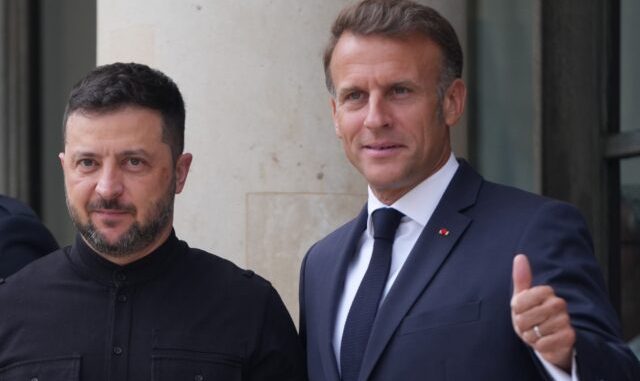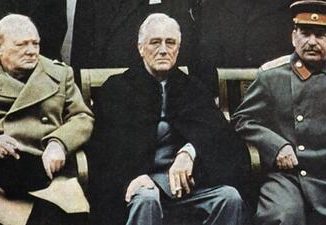
Published September 5, 2025
French President Emmanuel Macron announced that 26 countries have pledged post-war military support to Ukraine after any ceasefire deal with Russia. Macron said the planned deployments aim to ensure security, not provoke conflict. With US backing expected to be finalised soon, Ukraine’s President Zelensky called the move a major step forward.
Paris — French President Emmanuel Macron announced that 26 countries have pledged to contribute to a multinational “reassurance force” for Ukraine after the conflict with Russia ends. The announcement comes following a summit in Paris, part of the ongoing “coalition of the willing,” aimed at strengthening Ukraine’s long-term security.
Multidimensional Support: Troops, Training, and Equipment
Macron clarified that the contributions would span land, sea, and air, but would not involve frontline combat. Instead, the force is meant to deter future aggression, while some countries will provide training, equipment, and infrastructure support to bolster Ukraine’s postwar defense.
U.S. Role and Strategic Partnership
The United States has not committed ground troops, but Macron expressed expectations of U.S. involvement in security guarantees, intelligence sharing, and air support, signaling a complementary transatlantic partnership.
Ukraine’s Response
Ukrainian President Volodymyr Zelenskyy hailed the announcement as a critical step toward long-term security, praising the breadth of international support and the tangible aid already promised.
The Coalition Behind the Force
The plan builds on the March 2025 London Summit, where 31 countries initially pledged involvement in Ukraine’s postwar security. The Paris summit now translates those promises into concrete planning, with Macron emphasizing the importance of Western unity in deterring further Russian aggression.
👥 Public/Political Reactions
🏛️ Political Reactions
In Europe
-
French Leadership (Macron): Presented this as a historic step, framing France as the diplomatic driver of Europe’s security future.
-
Eastern Europe (Poland, Baltics): Generally supportive, seeing it as proof of Western resolve and a direct reassurance against Russian expansion.
-
Germany & Italy: More cautious—backing the pledge but signaling concerns about open-ended commitments and domestic budget constraints.
-
UK: Positioned itself as a major backer, stressing the importance of deterrence and NATO alignment.
In the United States
-
White House: Welcomed the move but avoided committing ground troops, instead pointing to air defense, intelligence, and logistics support.
-
Republicans (Right-Leaning): Divided—hawks applaud Europe stepping up, while populist voices warn against another “forever mission” that could drain Western taxpayers.
-
Democrats: Supportive, portraying it as a sign of multilateral strength and proof that U.S. leadership has rallied allies.
In Russia
-
Kremlin: Condemned the announcement as Western provocation, warning any foreign troops in Ukraine would be treated as legitimate military targets.
-
Russian Media: Amplifying narratives of “occupation,” framing it as evidence that the West seeks to control Ukraine militarily.
👥 Public Reactions
In Ukraine
-
Positive & Hopeful: The public views the pledge as proof that Western promises are real, boosting morale and belief that sovereignty will be protected.
-
Skepticism: Some Ukrainians remain cautious, recalling earlier pledges that were slow to materialize.
In Europe
-
Supportive in Eastern Europe: Citizens in countries bordering Russia largely back the move as a necessary shield.
-
Mixed in Western Europe: Some applaud the leadership role; others worry about costs, troop deployments, and possible escalation.
In the U.S.
-
Divided Opinion: Supporters see it as sharing the burden and proof of Western unity. Critics worry the U.S. may still end up paying disproportionately, or being pulled deeper into another foreign conflict.
Global South
-
Skeptical: Many nations outside the West view it as another Western-led intervention, some accusing Europe of double standards compared to conflicts elsewhere.
 Resulting Effects
Resulting Effects
🇪🇺 European Overreach vs. U.S. Caution
-
Europe Taking the Lead: Macron’s coalition demonstrates that Europe is willing to act independently, but right-leaning analysts might see this as Europe overextending itself militarily without clear, enforceable U.S. commitment.
-
U.S. Burden: Conservatives may stress that the United States is still expected to provide intelligence, air support, and logistics, highlighting a concern that the U.S. could ultimately bear disproportionate costs.
🛡️ Military Implications
-
Symbolic Force: Many right-leaning observers might argue that troop pledges are mostly symbolic, emphasizing political signaling rather than real deterrence against Russia.
-
Escalation Risks: Deploying foreign troops—even as a “reassurance” measure—could provoke Russia, increasing the risk of unintended clashes.
-
Long-Term Commitment: Right-leaning critics worry about mission creep, where temporary deployments could become an open-ended European or multinational military presence.
💰 Economic and Domestic Implications
-
Cost Concerns: Right-leaning voices will highlight the taxpayer burden in Europe and the U.S., questioning the wisdom of funding overseas security commitments indefinitely.
-
Domestic Backlash: Populist and conservative voters in contributing countries may push back against prolonged troop commitments, framing them as distractions from domestic priorities.
🌍 Geopolitical Implications
-
Western Unity Tested: While the pledge shows solidarity, right-leaning perspectives often point out that coalitions of this kind can be fragile, with disagreements over troop numbers, deployment timing, and financial contributions.
-
Russia’s Response: Any perceived Western “occupation” could be used by Moscow to justify aggressive countermeasures or rally domestic support against the West.
🔮 Future Outlook
🇺🇸 Western Resolve vs. U.S. Hesitation
-
The announcement shows Europe stepping up while the Biden administration (and possibly its successors) still hesitates to commit ground troops. From a right-leaning lens, this could embolden U.S. skeptics who argue that Washington is carrying too much of NATO’s burden already.
-
Expect continued calls for “America First” approaches: more support through weapons sales and intelligence rather than boots on the ground.
🛡️ Deterrence With Teeth
-
A strong multinational presence sends Moscow the clearest message yet: Western nations are willing to show up physically, not just with words or sanctions.
-
However, a right-leaning concern is that vague troop commitments (training, symbolic deployments) may not be enough to truly deter Putin unless backed by hard power and credible red lines.
💰 Economic and Domestic Concerns
-
Long-term foreign commitments may strain European taxpayers while the U.S. public grows more wary of endless spending abroad.
-
Right-leaning voices will highlight the risk that Europe’s push for troop commitments could sap resources from domestic priorities and fuel public backlash in countries like Germany, France, or the UK.
🌍 National Sovereignty vs. Globalism
-
A coalition acting outside of NATO may deepen divides: is this about protecting Ukraine, or expanding a European-led globalist framework that risks dragging unwilling nations into conflicts?
-
Right-leaning analysts will watch for mission creep—whether a “reassurance force” gradually becomes an occupation or peace enforcement mission with no clear end date.
🔮 Likely Path Ahead
-
Best Case: The reassurance force deters Russia, strengthens Ukraine, and shows Western strength without major escalation.
-
Worst Case: The force drags Europe (and possibly the U.S.) into a new quagmire, bleeding resources while Russia escalates hybrid warfare.
-
Most Likely: A symbolic multinational presence forms, but the heavy lifting still comes from U.S. weapons and intelligence, while Europe debates how much real commitment it can sustain.
 Bottom Line:
Bottom Line:
Macron’s announcement that 26 nations are ready to form a multinational reassurance force for Ukraine marks a decisive step in shaping the post-war landscape of Europe. On one hand, the pledge sends a powerful signal of unity and deterrence, assuring Kyiv that it will not stand alone once the guns fall silent. On the other hand, the move also raises the stakes with Moscow, which has already warned that any foreign troops would be treated as hostile targets.
The coalition’s strength lies in its diversity of contributions—from troop deployments to training, equipment, and intelligence sharing—ensuring Ukraine gains not only immediate security but also long-term defense capacity. Yet the plan is not without risks: political divisions in contributing nations, potential Russian retaliation, and questions about U.S. involvement could complicate implementation.
Ultimately, the reassurance force represents more than a military strategy. It is a geopolitical message: that Ukraine’s independence is a shared cause, and that the West is willing to turn promises into presence. The coming months will test whether this coalition can translate ambition into sustainable stability, without triggering the very escalation it seeks to prevent.
SOURCES: BREITBART – Macron Claims 26 Nations Willing to Send Troops into Ukraine as a ‘Reassurance Force’
THE WALL STREET JOURNAL – Macron Says 26 Countries Agree to Contribute to Ukraine’s Security
FRANCE 24 – 26 nations pledge post-war security support for Ukraine, Macron says





Be the first to comment